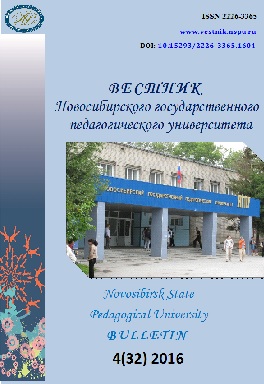Роль международных сравнительных исследований в развитии Казахстанской системы образования
The role of international comparative studies in the development of the Kazakhstan education system
Author(s): Zhanbol O. Zhilbaev, Lyalya Sarkytovna Syrymbetova, Bakhytgul Asylbekovna Zhetpisbayeva, Meiramgul Asylbekovna Zhetpisbayeva, Gulden Nurmambekovna AkbayevaSubject(s): Education, Language acquisition, Higher Education
Published by: Новосибирский государственный педагогический университет
Keywords: Education; international comparative studies; paradigmatic transformation; innovation; international student assessment; PISA; TIMS
Summary/Abstract: Kazakhstan's education system, like many other countries in recent years takes part in international comparative studies. As it is known, to improve the quality of education it is necessary to carry out continuous monitoring of the status and trends of its development, objective and adequate assessment of educational achievements of students. Especially it is important at the secondary level, laying the foundation for their further personal development and civic formation. Kazakhstan participation in the PISA study, TIMSS, PIRLS is dictated by a number of factors that lead to the need for reform the control and the evaluation of the education system: the integration of Kazakhstan education system into the world educational space, the implementation in Kazakhstan principles of the Bologna process, the need to introduce international quality standards of education and control of the results, changes in the content of education, the construction of the Kazakhstan education quality assessment system.The results of these studies indicate a slow and zigzag advancement of Kazakhstan's education to improve the quality of teaching functional literacy of students. In this article we try to find out some of the reasons that the results obtained are still below the OECD (Organization for Economic Cooperation and Development) average. In this regard, among the many factors of success/ failure of Kazakh students in solving problems of TIMSS (Trends in Mathematics and Science and Study) and PISA (Programme for International Student Assessment), we have identified the nature of study materials that tend to systematically set out in textbooks. Based on this, we analyzed the content of a number of textbooks in mathematics, chemistry and biology for the presence of these tasks, aimed at forming functional literacy of students. We believe that in the mathematical and natural scientific competences of students the functional literacy in a dominant position. This starting position for our study is connected with the fact that over the years, Kazakhstan is focused on the transition from knowledge-centered education to competency paradigm of learning.This allows more clearly define the goals of modern education policy, commensurate rate of educational progress in the world and in their own country, to track changes in the level of students' literacy in Kazakhstan over time to evaluate the factors that influence the results and the effectiveness of training and help in formulating recommendations and strategies to reform the education system in Kazakhstan.
Journal: Вестник Новосибирского государственного педагогического университета
- Issue Year: 6/2016
- Issue No: 4
- Page Range: 119-133
- Page Count: 15
- Language: English

